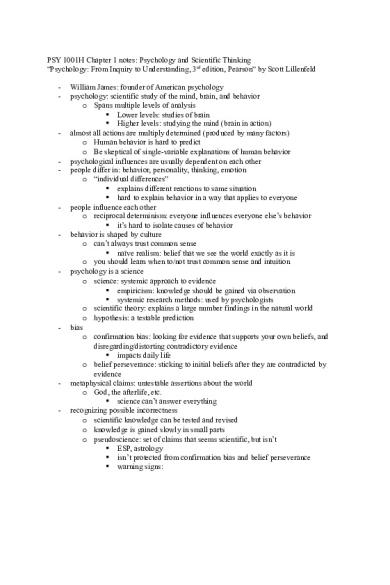Summary Psychology: From Inquiry to Understanding - chapter 1 outline PDF

| Title | Summary Psychology: From Inquiry to Understanding - chapter 1 outline |
|---|---|
| Author | Allison Cunningham |
| Course | Honors Introduction To Psychology |
| Institution | University of Minnesota, Twin Cities |
| Pages | 3 |
| File Size | 59.6 KB |
| File Type | |
| Total Downloads | 61 |
| Total Views | 132 |
Summary
Chapter 1 outline...
Description
PSY 1001H Chapter 1 notes: Psychology and Scientific Thinking “Psychology: From Inquiry to Understanding, 3rd edition, Pearson” by Scott Lillenfeld -
-
-
-
-
-
-
-
-
William James: founder of American psychology psychology: scientific study of the mind, brain, and behavior o Spans multiple levels of analysis Lower levels: studies of brain Higher levels: studying the mind (brain in action) almost all actions are multiply determined (produced by many factors) o Human behavior is hard to predict o Be skeptical of single-variable explanations of human behavior psychological influences are usually dependent on each other people differ in: behavior, personality, thinking, emotion o “individual differences” explains different reactions to same situation hard to explain behavior in a way that applies to everyone people influence each other o reciprocal determinism: everyone influences everyone else’s behavior it’s hard to isolate causes of behavior behavior is shaped by culture o can’t always trust common sense naïve realism: belief that we see the world exactly as it is o you should learn when to/not trust common sense and intuition psychology is a science o science: systemic approach to evidence empiricism: knowledge should be gained via observation systemic research methods: used by psychologists o scientific theory: explains a large number findings in the natural world o hypothesis: a testable prediction bias o confirmation bias: looking for evidence that supports your own beliefs, and disregarding/distorting contradictory evidence impacts daily life o belief perseverance: sticking to initial beliefs after they are contradicted by evidence metaphysical claims: untestable assertions about the world o God, the afterlife, etc. science can’t answer everything recognizing possible incorrectness o scientific knowledge can be tested and revised o knowledge is gained slowly in small parts o pseudoscience: set of claims that seems scientific, but isn’t ESP, astrology isn’t protected from confirmation bias and belief perseverance warning signs:
-
-
-
overuse of ad hoc immunizing hypotheses lack of self-correction overreliance on anecdotes brains are programed to find order in nonsense: reason for our draw to pseudoscience loss of sense of control – prone to false beliefs terror management theory: awareness of inevitable death causes fear, which we cope with by adapting worldviews that give meaning beyond our lives o logical fallacies: traps in thinking that result in mistaken conclusions emotional reasoning fallacy: using emotions as guides when evaluating the validity of a claim bandwagon fallacy: assuming something is true because other people think it is not me fallacy: belief that you’re immune to errors in thinking that affect other people o bias blind spot: people see others’ biases, but not their own dangers of pseudoscience and pseudoscientific treatments o opportunity cost: treatments lead people away from actual treatments o direct harm: causes physical/psychological damage rebirthing therapy: mimicking sensation of birth o inability to think scientifically: slows reaching decisions about global warming, genetics, etc. scientific thinking o scientific skepticism open-mindedness to all claims accept claims that are subjected to scientific tests don’t accept claims just on basis of authority o framework for scientific thinking critical thinking: set of skills for evaluating claims carefully and with an open mind principles: ruling out rival hypotheses correlation isn’t causation o correlation-causation fallacy: 2 variables that are correlated don’t necessarily cause each other falsifiability replicability extraordinary claims require extraordinary evidence occam’s razor/principle of parsimony o if 2 explanations are given for something, the simpler one is most likely to be true history of psychology o early history used to be like philosophy 1879: Wilhelm Wundt: 1st psych lab in Leipzig, Germany
used experimental methods (incl. introspection) beginning of psychology as a science theoretical frameworks 5 major perspectives: o structuralism (Titchener): identifying basic elements of psychological experience o functionalism (Darwin): understanding purposes/functions of psychological characteristics o behaviorism (Watson): finding general principles of learning underlying behavior observable behavior only o cognitivism (Piaget): thinking affects behavior o psychoanalysis (Freud): internal psychological processes modern psychology there are 500,000 psychologists worldwide o many areas of interest different types of psychology and work settings debates nature vs. nurture o are behaviors due to genes or upbringing? free-will determinism o do we choose our behaviors, or are they controlled by outside factors? how psychology affects life basic research: how the mind works applied research: how we use basic research to solve problems...
Similar Free PDFs

Chapter 1 - intro to psychology
- 2 Pages
Popular Institutions
- Tinajero National High School - Annex
- Politeknik Caltex Riau
- Yokohama City University
- SGT University
- University of Al-Qadisiyah
- Divine Word College of Vigan
- Techniek College Rotterdam
- Universidade de Santiago
- Universiti Teknologi MARA Cawangan Johor Kampus Pasir Gudang
- Poltekkes Kemenkes Yogyakarta
- Baguio City National High School
- Colegio san marcos
- preparatoria uno
- Centro de Bachillerato Tecnológico Industrial y de Servicios No. 107
- Dalian Maritime University
- Quang Trung Secondary School
- Colegio Tecnológico en Informática
- Corporación Regional de Educación Superior
- Grupo CEDVA
- Dar Al Uloom University
- Centro de Estudios Preuniversitarios de la Universidad Nacional de Ingeniería
- 上智大学
- Aakash International School, Nuna Majara
- San Felipe Neri Catholic School
- Kang Chiao International School - New Taipei City
- Misamis Occidental National High School
- Institución Educativa Escuela Normal Juan Ladrilleros
- Kolehiyo ng Pantukan
- Batanes State College
- Instituto Continental
- Sekolah Menengah Kejuruan Kesehatan Kaltara (Tarakan)
- Colegio de La Inmaculada Concepcion - Cebu














